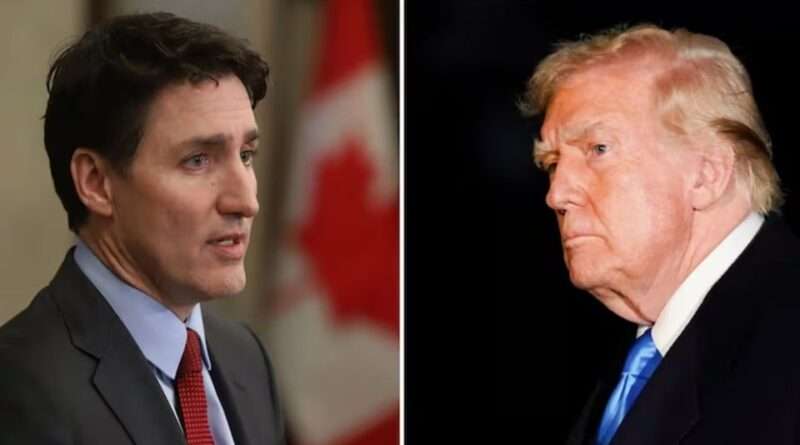US Protectionist Moves Spark Backlash from Allies
|
Getting your Trinity Audio player ready...
|
Introduction
The US government’s recent protectionist policies have sparked widespread backlash from key global allies. Under the leadership of former President Donald Trump, tariff impositions on major trading partners, including Canada, Mexico, and the European Union, have triggered economic instability, consumer protests, and diplomatic tensions. As the world grapples with these changes, experts warn of severe repercussions for global trade, inflation, and economic growth.
US Tariff Policies and Their Global Impact
The introduction of high tariffs on imported goods from key allies has not only disrupted trade relations but also placed significant strain on global economies. The European Union and Canada have raised concerns, warning that reciprocal tariffs could further damage economic growth and escalate inflationary pressures.
Economic Consequences of Protectionist Policies
Protectionist policies have far-reaching effects that go beyond trade restrictions. The consequences include:
- Rising Inflation: Increased import costs have led to higher prices for essential goods, particularly in the US.
- Declining Consumer Confidence: Reports indicate that American consumer confidence has declined sharply, with fears of inflation and economic downturn spreading.
- Industry Struggles: Companies dependent on international supply chains, such as Tesla and German car manufacturers, are witnessing a drastic fall in sales and profits.
Impact on American and European Economies
The protectionist stance is proving to be counterproductive, with economists forecasting a decline in GDP across multiple economies. Predictions indicate:
- EU exports to the US could fall by 15-17%.
- The EU economy may shrink by 0.4% in 2025, with further contractions in 2026.
- The US GDP is projected to decrease by 0.17%, doubling in economic damage if retaliatory tariffs are implemented.
- Germany’s manufacturing exports to the US may decline by 20%.
- Canada and Mexico face severe economic slowdowns due to new tariff restrictions.
Canadian Response to US Tariffs
Canadian Prime Minister Justin Trudeau has vowed to take necessary steps to counteract unfair tariff impositions. Canada, one of the US’s largest trading partners, has warned that such measures will have long-term implications for diplomatic and economic ties. Trudeau emphasized that Canada would not hesitate to impose reciprocal tariffs in response to American restrictions.
Industry-Specific Impact of Tariffs
Certain industries are facing greater consequences due to high tariffs, including:
- Automobile Industry: German car manufacturers such as BMW, Volkswagen, and Porsche are experiencing reduced sales in the US market.
- Tech Industry: Companies like Tesla are struggling with higher production costs and declining consumer interest.
- Energy Sector: Increased tariffs on raw materials and oil imports are making energy prices more volatile.
Trump’s America First Policy and Global Trade Disruptions
Trump’s “America First” policy has led to increased economic uncertainty and geopolitical shifts. Critics argue that the policy mirrors outdated economic strategies and could ultimately weaken America’s global economic leadership.
International Diplomacy at Risk
Beyond economic implications, the tariff war has negatively impacted international diplomacy. The latest US-Ukraine negotiations and other global alliances are now being influenced by protectionist strategies rather than cooperative trade policies. Political experts believe that continued tariff escalations could lead to long-term diplomatic rifts.
Future of US Protectionism and Its Global Consequences
Economists and trade analysts believe that the future of US trade policies will depend on diplomatic efforts and economic realities. They suggest that a collaborative approach to international trade could:
- Reduce inflationary pressures.
- Restore business confidence.
- Stabilize supply chains.
- Encourage foreign investments in the US market.
The Need for Global Economic Cooperation
Protectionist policies have resulted in economic disruptions, inflation, and increased trade tensions. Moving forward, experts urge policymakers to adopt a more balanced approach that promotes competition and cooperation rather than isolationism.
FAQs
1. How have US tariffs affected global trade?
US tariffs have disrupted international trade by increasing costs for imported goods, leading to inflation, lower exports, and strained diplomatic relations with key allies.
2. Why is Canada opposing US tariffs?
Canada views the tariffs as unjustified and harmful to its economy. Prime Minister Trudeau has pledged to take countermeasures to protect Canadian businesses and workers.
3. How have protectionist policies impacted US consumers?
American consumers face rising costs for essential goods and services, contributing to lower consumer confidence and economic uncertainty.
4. What industries are most affected by the tariffs?
The automobile, technology, and energy sectors have been hit hardest due to increased costs, supply chain disruptions, and declining exports.
5. What is the outlook for global trade in the coming years?
If protectionist policies continue, global trade may see further disruptions, economic slowdowns, and diplomatic tensions. However, cooperative trade policies could help stabilize the situation.




